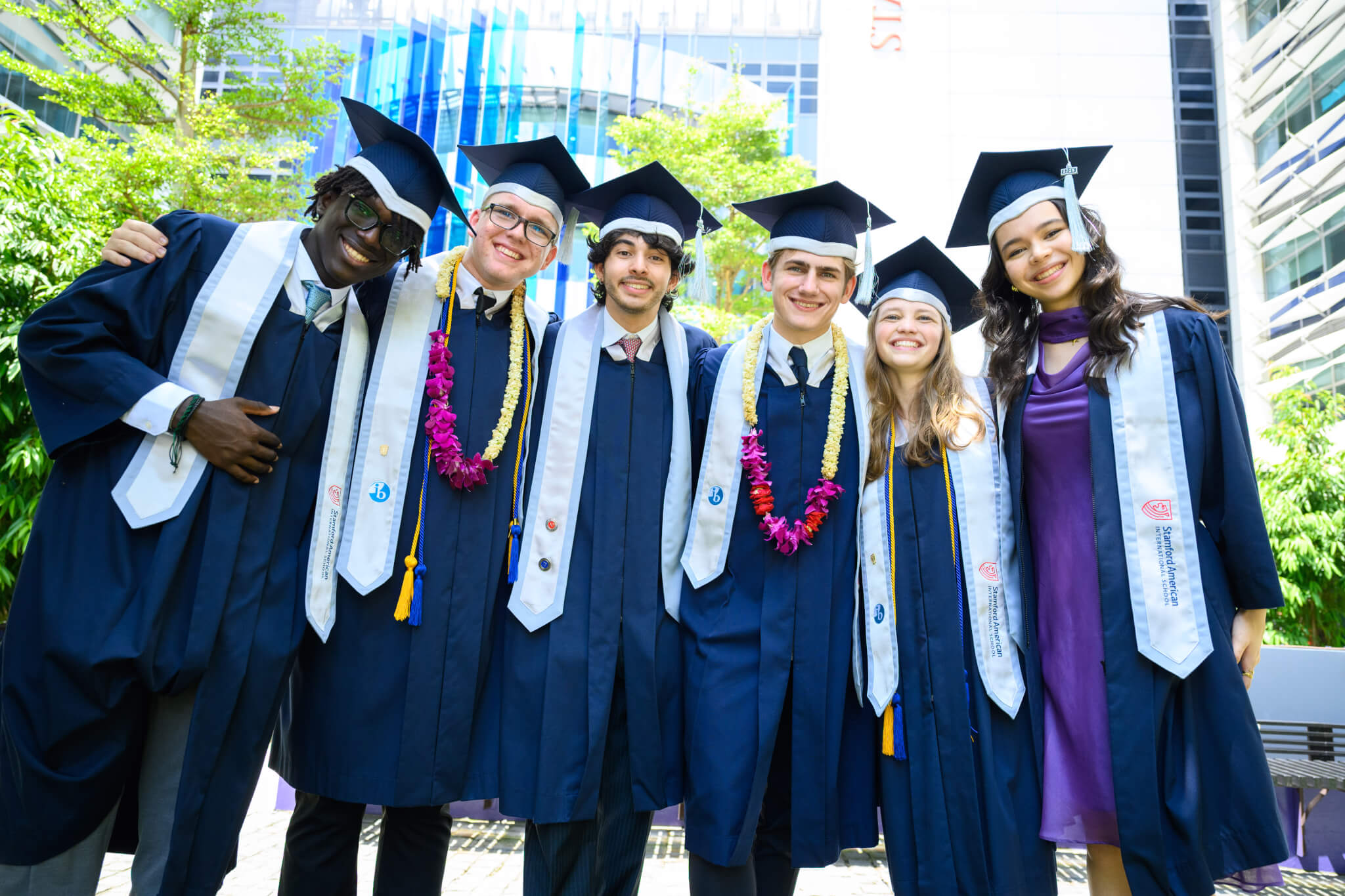In today’s interconnected world, preparing students for real-life success means more than just academic excellence. International schools, especially in global hubs like Singapore, are equipping students with the skills, mindsets, and cultural fluency needed to thrive in diverse, fast-evolving workplaces. Long before graduation, students are being equipped to navigate diverse cultural contexts and think critically about complex, real-world issues, and for good reason. Today, career success hinges not only on academic performance but also on a student’s ability to approach challenges with thoughtfulness and intention.
Parents around the world have witnessed these shifts firsthand, and it’s only natural that they want schools to prepare students for the future of work. While mainstream education systems are still adapting to this evolving landscape, international schools have already positioned themselves as hubs for future-ready graduates. With globally recognized curricula and inherently multicultural classrooms, these institutions are uniquely equipped to prepare students for meaningful engagement in an increasingly diverse and interconnected workforce.
If you’re a parent thinking about your child’s future in an increasingly globalized world, this guide is for you. It explores how international schools equip students for the jobs of tomorrow, highlighting the unique ways these institutions foster the development of effective, future-ready leaders.
- Global Recognition Enhances University and Career Opportunities
Many International schools offer globally recognized programs such as the International Baccalaureate Diploma Programme (IBDP), Advanced Placement (AP) courses, or Business and Technology Education Council (BTEC) qualifications. These credentials are recognized qualifications or widely accepted by universities across the globe, expanding students’ post-secondary options significantly. In some countries, completing the IB Diploma or AP courses can even shorten the time and reduce the cost required to earn a university degree.
In addition to broadening chances of success in university admissions in Singapore and overseas, these credentials are also highly regarded by many of the world’s leading employers. Completing programs like the IBDP, AP, or BTEC—core components of many a respected international school currciulum—can strengthen a student’s resume early in their career, signaling a strong foundation and familiarity with international standards. Together, these advantages help ease the transition from high school to higher education or the workforce, setting students on a clear path toward successful international careers.
- International Schools Foster Valuable Inquiry-led Learning
Global careers demand more than rote knowledge — they require the ability to think critically, ask meaningful questions, and develop well-reasoned conclusions. Many international schools embrace student-led inquiry and other exploratory learning approaches that nurture these essential 21st century-skills from an early age. By encouraging curiosity, independent thinking, and problem-solving, these schools provide an ideal environment for ambitious students preparing to thrive in complex, fast-evolving professional landscapes.
Unlike many mainstream education systems, international schools often encourage students to engage in open-ended research and interdisciplinary exploration. A prime example is the Theory of Knowledge (TOK) course required in the IB program, which teaches students to critically evaluate claims, consider diverse perspectives, and understand how knowledge is influenced by culture, context, and authority. Once these habits of mind are established, students are better equipped to navigate and interpret the complexities of real-world challenges.
- Advanced Language Learning Expands Students’ Opportunities
Language learning is a cornerstone of the curriculum in many international schools. Students are typically required to study at least one additional language alongside their native tongue, fostering multilingualism from an early age. At leading institutions, students may also have access to immersion or bilingual instruction, offering deeper cultural understanding and fluency.
These opportunities enable students to develop strong multilingual skills in both speaking and writing—often during the years when they are most receptive to language acquisition. Early exposure allows learners to absorb grammar, pronunciation, and cultural nuances more naturally than adult learners typically can. This early and continuous exposure to languages also helps students develop fluency in both written and spoken communication. More importantly, it strengthens cultural awareness and adaptability, essential traits in international business, diplomacy, and cross-border collaboration. Multilingualism opens the door to global universities and employers, positioning students for international success.
- Multicultural Learning Environments Reflect the Real World
Even when international schools serve specific national communities, their classrooms typically include students from diverse cultural and linguistic backgrounds. This diversity offers invaluable early exposure to multicultural perspectives, easing students’ transition into today’s globalized workplaces.
Through daily interactions and collaborative projects, students develop an appreciation for different ways of thinking and learn to communicate with cultural sensitivity. This informal, everyday cross-cultural engagement fosters a level of adaptability and empathy that textbooks alone cannot provide, preparing students for lifelong success in diverse environments.
- Soft Skills Receive the Attention They Deserve
It is now widely recognized that academic achievement alone rarely ensures career readiness. While leading international schools maintain high academic standards, they also prioritize the development of interpersonal skills. Students gain hands-on experience in leading group projects, presenting and advocating ideas, and planning and organizing their schedules efficiently. These real-world experiences help develop strong communication, time management, and adaptability—traits that global employers consistently prioritize.
Though more difficult to measure, these soft skills are essential for success in today’s fast-paced, team-driven workplaces, where collaboration with diverse teams is the norm.
- Students Learn Ethics and Global Citizenship
Future decision-makers frequently encounter complex ethical challenges that cross international boundaries. Leading international schools recognize this and integrate values-based education to nurture integrity, respect, and responsibility in their students.
Beyond discussions on topics like sustainability and digital responsibility, students are encouraged to reflect on how their actions affect communities both locally and globally. This focus cultivates globally minded citizens who think critically about their roles and responsibilities in an interconnected world.
In many international schools, service learning and field-based programs play a vital role in fostering global awareness. These initiatives encourage students not only to engage with social and environmental issues but also to explore their root causes and collaborate on sustainable solutions. This hands-on approach cultivates a deeper, more empathetic understanding of civic responsibility and active citizenship.
Complementing these efforts, some schools offer field studies programs that take students beyond the classroom and into real-world environments. These experiences often involve cultural immersion, environmental exploration, and outdoor leadership training. Carefully designed to build age-appropriate skills, such programs help students cultivate essential qualities needed to thrive in today’s diverse and interconnected world.
- Interdisciplinary Learning Encourages Big-Picture Thinking
International school programs often emphasize connecting academic disciplines, sometimes integrating subjects that are traditionally viewed as separate. This approach helps students see how different areas of knowledge intersect with real-world events and societal issues. For example, exploring the relationship between literature and political history can deepen understanding of economic or ethical perspectives.
Over time, interdisciplinary learning enables students to recognize patterns and think beyond conventional boundaries, equipping them to anticipate the broader consequences of decisions. This holistic mindset is invaluable in preparing students for the complexities of the real world, where actions often have far-reaching effects.
- Independent Projects Build Confidence and Focus
Students at leading international schools are often tasked with collegiate-level independent projects. For example, the IB Diploma Programme requires learners to complete the Extended Essay, a comprehensive research project on a topic of their choice. Beyond fostering an appreciation for rigorous research, these projects help students develop analytical depth, independence, and perseverance — qualities that are essential for success in higher education and the workplace.
- Diverse Co-Curricular Programs Reinforce Real-World Skills
International schools often provide a wide array of co-curricular activities, including debate, robotics, performing arts, and sports. These programs go beyond introducing students to new disciplines — they also simulate real-world workplace dynamics, offering valuable opportunities to develop skills in public speaking, teamwork, and project leadership.
In addition to skill development, co-curricular activities can ignite passions that influence students’ university choices and career paths. Participation in these programs often provides practical insights that help shape academic and professional ambitions.
- Holistic Education Fosters Lifelong Adaptability
One of the greatest strengths of international education lies in its focus on whole-person development, especially within frameworks such as the IBDP and AP. Rather than simply teaching routines, these programs encourage students to reflect on their learning and embrace change. This adaptability is increasingly vital in a world where industries evolve rapidly and career paths are no longer linear.
Preparing for the Future at Stamford American International School
At Stamford American International School in Singapore, students benefit from a truly global education designed to prepare them for success in both university and the modern workplace. Offering an exceptional choice of three internationally recognized academic pathways—the International Baccalaureate (IB) Diploma Programme, Advanced Placement (AP), and Business and Technology Education Council (BTEC)—Stamford empowers students to personalize their learning while building a strong academic foundation that is respected by universities and employers around the world.
Beyond academics, Stamford delivers a future-ready education through a rich blend of multicultural exposure, bilingual language programs, co-curricular enrichment, and values-based learning. Students collaborate across cultures, lead real-world projects, and develop essential soft skills such as adaptability, resilience, communication, and global citizenship—qualities that are increasingly valued in today’s evolving workforce.
Our diverse international community of over 75 nationalities, combined with hands-on learning experiences and strong pastoral care, ensures each student receives the guidance, confidence, and global perspective needed to thrive in a dynamic, interconnected world.
Whether your child is preparing for university, exploring their passions, or developing leadership skills, Stamford American International School is committed to nurturing future-ready, globally minded graduates
To learn more about how Stamford American can support your child’s educational journey, please contact us or schedule a tour.






